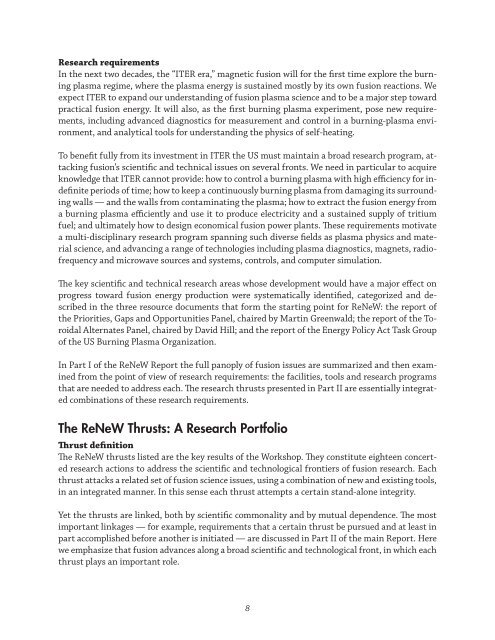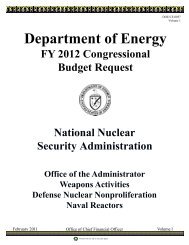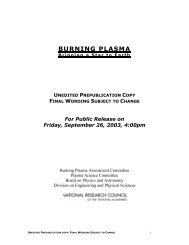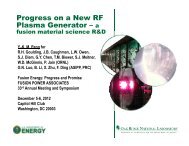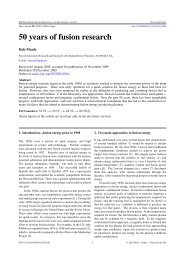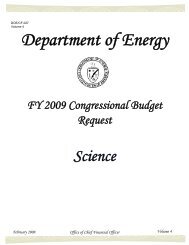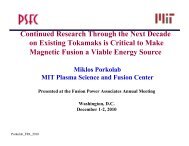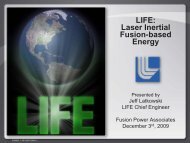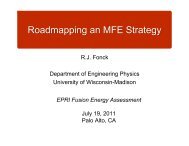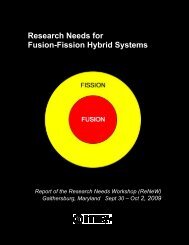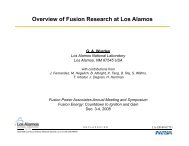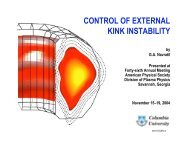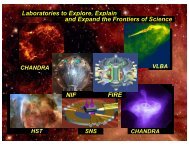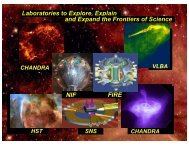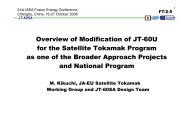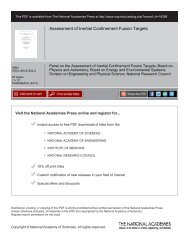- Page 1 and 2: Research Needs for Magnetic Fusion
- Page 3: Research Needs for Magnetic Fusion
- Page 7 and 8: ExEcutivE SuMMaRy nuclear fusion
- Page 9: Magnetic confinement magnetic confi
- Page 13 and 14: eactor, most heat comes from fusion
- Page 15 and 16: thrust 18: achieve high-performance
- Page 17 and 18: confinement is measured by the so-c
- Page 19: PART I: ISSUES AND RESEARCH REQUIRE
- Page 22 and 23: ReneW Organization: Themes The stru
- Page 24 and 25: 22 Table 1. ReNeW Thrusts Address R
- Page 26 and 27: ON PREVIOUS PAGE Nonlinear simulati
- Page 28 and 29: extended operation phase. The optim
- Page 30 and 31: Figure 2. Alpha particles can cause
- Page 32 and 33: Figure 3. Spectrogram of the time-v
- Page 34 and 35: Do the alpha particles couple to th
- Page 36 and 37: • improved understanding of the e
- Page 38 and 39: most relevant to iteR. Recent obser
- Page 40 and 41: H-mode access: access to the h-mode
- Page 42 and 43: although present-day devices have m
- Page 44 and 45: estimates indicate that it will be
- Page 46 and 47: can enter the plasma core and dimin
- Page 48 and 49: ent drive alone cannot account for
- Page 50 and 51: Figure 10. Control involves the ele
- Page 52 and 53: to operation of iteR. solutions for
- Page 54 and 55: • identification and stabilizatio
- Page 56 and 57: Disruption prediction accurate pred
- Page 58 and 59: Figure 12. The application of non-a
- Page 60 and 61:
ion losses, a quantitative predicti
- Page 62 and 63:
due to incompatibility of the measu
- Page 64 and 65:
agnostic measurements of critical p
- Page 66 and 67:
quires assessment of when potential
- Page 68 and 69:
suggesTions for furTher reading 1.
- Page 70 and 71:
miTigaTing TransienT eVenTs in a se
- Page 72 and 73:
ON PREVIOUS PAGE Nonlinear simulati
- Page 74 and 75:
increasing power density and pulse
- Page 76 and 77:
of recent accomplishments that have
- Page 78 and 79:
ity limits have been maintained. in
- Page 80 and 81:
highly risky in such an environment
- Page 82 and 83:
proximity-coil-based magnetics is ~
- Page 84 and 85:
will dominate the external sources
- Page 86 and 87:
The barrier gradient is generally l
- Page 88 and 89:
interaction with plasma boundary an
- Page 90 and 91:
itER-at aRiES-i aRiES-at b n (%) 3.
- Page 92 and 93:
and morphology, are needed. new mea
- Page 94 and 95:
field and temperature fluctuations
- Page 96 and 97:
large-scale process control problem
- Page 98 and 99:
tics. integrated control methods fo
- Page 100 and 101:
ing and design include computationa
- Page 102 and 103:
dated in the corresponding structur
- Page 104 and 105:
These requirements are applicable t
- Page 106 and 107:
• assess computationally, on test
- Page 108 and 109:
Research Requirements for Electron
- Page 110 and 111:
the launcher design is partly “tr
- Page 112 and 113:
tunities and goals for a few of the
- Page 114 and 115:
front layers of the field magnets c
- Page 116 and 117:
R&D Strategy a number of critical t
- Page 118 and 119:
formance burning plasmas are covere
- Page 120 and 121:
CreaTing prediCTaBle, high-performa
- Page 122 and 123:
magneTs JosePh mineRvini, massachus
- Page 124 and 125:
ON PREVIOUS PAGE Design of the ITER
- Page 126 and 127:
to stabilize deleterious plasma mod
- Page 128 and 129:
longer than the (solid) thermal equ
- Page 130 and 131:
Promising new ideas have been devel
- Page 132 and 133:
to handle 10 mW/m 2 , and elms with
- Page 134 and 135:
• liquid surface PFc operation in
- Page 136 and 137:
integrated effort that includes fun
- Page 138 and 139:
Taming The plasma-maTerial inTerfaC
- Page 140 and 141:
138
- Page 142 and 143:
ON PREVIOUS PAGE Design of an ITER
- Page 144 and 145:
trons in the breeding blanket. Thes
- Page 146 and 147:
Safety and Environment • developm
- Page 148 and 149:
plasma and gas to the scrape-off la
- Page 150 and 151:
gaps: need to select and test the t
- Page 152 and 153:
• neutron and other radiation tra
- Page 154 and 155:
emphasis on modeling and expertise
- Page 156 and 157:
gap: Current understanding of stren
- Page 158 and 159:
Research needs critical research ne
- Page 160 and 161:
• Proposing integrated safety des
- Page 162 and 163:
• techniques and instruments to a
- Page 164 and 165:
Qualifying DEMO Components Possible
- Page 166 and 167:
• developing the design of an eff
- Page 168 and 169:
harnessing fusion power Theme memBe
- Page 170 and 171:
168
- Page 172 and 173:
ON PREVIOUS PAGE Reconstruction of
- Page 174 and 175:
Figure 1. Configuration space for t
- Page 176 and 177:
of 40%.) localized instabilities (t
- Page 178 and 179:
• Reduction of spheromak magnetic
- Page 180 and 181:
ment, but also micro- and macro-ins
- Page 182 and 183:
esearch requirements • evaluate t
- Page 184 and 185:
the banana regime, low turbulent tr
- Page 186 and 187:
in stellarator discharges with ohmi
- Page 188 and 189:
• investigate how demountable coi
- Page 190 and 191:
tion using a central solenoid is al
- Page 192 and 193:
functions, edge flows, and edge neu
- Page 194 and 195:
Development of predictive capabilit
- Page 196 and 197:
Edge localized modes (ELMs): edge l
- Page 198 and 199:
theory predictions for alfvén inst
- Page 200 and 201:
coils, to permit replacement of the
- Page 202 and 203:
stand the relative roles of long-to
- Page 204 and 205:
Table 1. 202
- Page 206 and 207:
primarily electrostatic, in the cas
- Page 208 and 209:
to be important in present experime
- Page 210 and 211:
PLaSMa bOunDaRy intERaCtiOnS The ex
- Page 212 and 213:
calized field errors that can cause
- Page 214 and 215:
needed Theory, Computation, Modelin
- Page 216 and 217:
Scientific Issues and research requ
- Page 218 and 219:
esearch requirements new facilities
- Page 220 and 221:
small, concept exploration experime
- Page 222 and 223:
tRanSPORt: DEtERMinE unDERLying tRa
- Page 224 and 225:
esearch requirements analysis of ne
- Page 226 and 227:
nEEDED FaCiLitiES nEEDED tHEORy, CO
- Page 228 and 229:
connections Between Research Requir
- Page 230 and 231:
opTimizing The magneTiC ConfiguraTi
- Page 232 and 233:
230
- Page 234 and 235:
232
- Page 236 and 237:
234
- Page 238 and 239:
Proposed actions: • Prioritize bu
- Page 240 and 241:
3) as planning matures for the rese
- Page 242 and 243:
that have high impact, that benefit
- Page 244 and 245:
could have an impact on the identif
- Page 246 and 247:
The Us fusion program is well posit
- Page 248 and 249:
Mitigation of disruptions in the ev
- Page 250 and 251:
elevant plasmas for very long pulse
- Page 252 and 253:
and stability, and mitigation requi
- Page 254 and 255:
• control alpha heating feedback
- Page 256 and 257:
heavy ion beam probes (already in u
- Page 258 and 259:
alpha particles (ash removal). mode
- Page 260 and 261:
• determine minimum heating power
- Page 262 and 263:
Research should focus on developing
- Page 264 and 265:
estal structure need to be coupled
- Page 266 and 267:
• sufficient heating with little
- Page 268 and 269:
Proposed actions: Short-term: begin
- Page 270 and 271:
Demonstrate active control of the p
- Page 272 and 273:
Demonstrate burn control and contro
- Page 274 and 275:
Develop the means for and demonstra
- Page 276 and 277:
Medium-term: Test and optimize full
- Page 278 and 279:
276
- Page 280 and 281:
• Recruit, train and support dedi
- Page 282 and 283:
With this information in hand, phys
- Page 284 and 285:
to carry out the validation program
- Page 286 and 287:
and new devices could be designed w
- Page 288 and 289:
• high-field sc magnets for stead
- Page 290 and 291:
Element 2 — High current conducto
- Page 292 and 293:
Element 7 — integration of conduc
- Page 294 and 295:
many other scientific fields are be
- Page 296 and 297:
• based on these assessments, pro
- Page 298 and 299:
systems include neutral beams, ion
- Page 300 and 301:
The Us d-t facility, studied in 1b,
- Page 302 and 303:
300
- Page 304 and 305:
• design and implement innovation
- Page 306 and 307:
the controlling instabilities and s
- Page 308 and 309:
cross-field transport in the pedest
- Page 310 and 311:
The modeling of near-surface plasma
- Page 312 and 313:
310
- Page 314 and 315:
• build large-size test stands wh
- Page 316 and 317:
trol of the energy, impact angle, a
- Page 318 and 319:
ties that take advantage of simple
- Page 320 and 321:
ased materials development with adv
- Page 322 and 323:
introduction Thrust 11 addresses th
- Page 324 and 325:
technology is now evolving to inclu
- Page 326 and 327:
The elements of a thrust to develop
- Page 328 and 329:
The plasma facing components in a d
- Page 330 and 331:
to demonstrate that steady and tran
- Page 332 and 333:
mum of nuclear activation and prese
- Page 334 and 335:
332
- Page 336 and 337:
introduction harnessing fusion powe
- Page 338 and 339:
each Thrust 13 element includes the
- Page 340 and 341:
Figure 3. System concept for perfor
- Page 342 and 343:
equirements. Understanding the fuel
- Page 344 and 345:
• Use a combination of existing a
- Page 346 and 347:
chemical interactions between the s
- Page 348 and 349:
dose fusion-relevant environment wi
- Page 350 and 351:
Use a combination of existing and n
- Page 352 and 353:
350
- Page 354 and 355:
evaluate, through advanced design a
- Page 356 and 357:
at the time when the demo design is
- Page 358 and 359:
3. Computational analysis managemen
- Page 360 and 361:
Materials and Components: Fuel Cycl
- Page 362 and 363:
• employ energetic particle beams
- Page 364 and 365:
• develop and validate theoretica
- Page 366 and 367:
• develop new diagnostics for int
- Page 368 and 369:
• increase sustained noninductive
- Page 370 and 371:
368
- Page 372 and 373:
Proposed actions: 1. conduct two qu
- Page 374 and 375:
The key areas in which new knowledg
- Page 376 and 377:
• exploration of high-temperature
- Page 378 and 379:
• availability of high-power radi
- Page 380 and 381:
378
- Page 382 and 383:
• study FRc stability at small io
- Page 384 and 385:
techniques for integrated data anal
- Page 386 and 387:
4. based on the outcome of actions
- Page 388 and 389:
2. With information from action 1,
- Page 390 and 391:
388
- Page 392 and 393:
aCROnyMS anD abbREViatiOnS (continu
- Page 394 and 395:
aCROnyMS anD abbREViatiOnS (continu
- Page 396 and 397:
aCROnyMS anD abbREViatiOnS (continu
- Page 398 and 399:
aPPENdix c: tHEME WoRKSHoPS tHEME W
- Page 400 and 401:
14. d.l. humphreys, Active Realtime
- Page 402 and 403:
tHEME 2: CREating PREDiCtabLE HigH-
- Page 404 and 405:
43. t.W. Petrie, White Paper: Some
- Page 406 and 407:
tHEME 3: taMing tHE PLaSMa MatERiaL
- Page 408 and 409:
37. e.J. strait, J.c. Wesley, m.J.
- Page 410 and 411:
20. s.a. maloy and e. Pitcher, Fusi
- Page 412 and 413:
tHEME 5: OPtiMizing tHE MagnEtiC CO
- Page 414 and 415:
39. P.W. terry, a. boozer, J.s. sar
- Page 416 and 417:
don coRRell, lawrence livermore nat
- Page 418 and 419:
GeoRGe mckee, University of Wiscons
- Page 420 and 421:
tony tayloR, General atomics RichaR


